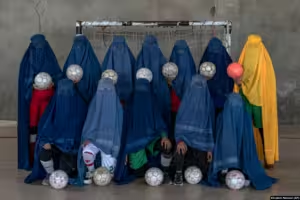
Women’s Rights or State Control?
The Ministry of Promotion of Virtue and Prevention of Vice’s latest report boasts of achievements such as preventing over 300 forced marriages, stopping nearly 300 cases of women being sold, and resolving inheritance disputes for over 700 women. While these claims are trumpeted as milestones for women’s rights, they conceal a darker reality of intensified state control and repression. Far from fostering empowerment, these actions reinforce the Taliban’s authoritarian grip and fail to address the underlying issues driving forced marriages and other forms of abuse.
The Taliban’s return to power has seen a troubling rise in early and forced marriages, driven by families’ fears of coercion from Taliban fighters or officials. With severe restrictions on women’s education and public presence, many view early marriage as a protective measure rather than a choice. The Ministry’s interventions, framed as progressive reforms, only serve to cement the Taliban’s control, offering superficial solutions while perpetuating a system of dependency and repression.

Recent Taliban laws highlight this trend of control, mandating that women cover their faces completely and silencing their voices in public, deeming them “awrah” or intimate. These measures, under the guise of Islamic principles, are mechanisms of authoritarian rule, designed to diminish women’s visibility and participation in society. The purported advancements are, in reality, a deepening of repression, masking the regime’s true intent to consolidate power and suppress dissent.
The Ministry’s so-called successes are a smokescreen for a broader agenda of cultural erasure and gender-based oppression. By promoting these measures as moral and social reforms, the Taliban seeks to legitimize its increasingly oppressive tactics. This strategy not only marginalizes women but also undermines genuine progress, replacing it with a facade of control and manipulation. True empowerment and rights for women cannot be achieved under a regime that prioritizes repression and conformity over genuine reform and autonomy.
Cultural Destruction Disguised as Moral Enforcement

The Ministry of Promotion of Virtue and Prevention of Vice is aggressively dismantling Afghanistan’s cultural heritage under the guise of enforcing Islamic morality. Their recent report boasts the destruction of over 21,000 musical instruments and the arrest of nearly 1,000 amulet-makers and alleged sorcerers. These actions, framed as moral imperatives, reveal a deeper, more troubling agenda: the systematic eradication of Afghanistan’s cultural and artistic traditions.
Destroying musical instruments is not merely a crackdown on perceived immorality but a direct assault on Afghanistan’s cultural fabric. Music has long been integral to Afghan life, serving as a vital medium for storytelling and communal bonding. The Ministry’s actions not only erase a significant part of the nation’s heritage but also silence women who play crucial roles as musicians and performers in ceremonies and daily life.
The Ministry’s actions drive Afghanistan toward cultural homogenization, erasing traditional practices and the roles of women within them. This suppression of artistic and cultural expression under the pretext of moral enforcement represents a significant threat to both the nation’s rich heritage and women’s place within it. The Ministry’s campaign reveals a broader strategy of control, where the rich, multifaceted identity of Afghan society is replaced by a narrow, state-defined version of morality and culture.
A Punitive Approach to Social Control

The Ministry of Promotion of Virtue and Prevention of Vice has reported detaining over 13,000 individuals for alleged “immoral activities,” with 7,204 held for 24 hours and 4,737 for 72 hours. This extensive use of detention, under the guise of moral correction, reflects a broader strategy of repression aimed at controlling the population. Among those detained were numerous women, who face disproportionate scrutiny and punitive measures under these policies.
Women are particularly targeted by these repressive measures, which are not merely about enforcing moral codes but about suppressing dissent and ensuring conformity. The Ministry’s mass detention strategy, combined with the referral of over 1,000 individuals to judicial authorities, reveals a pattern of state-led oppression that disproportionately affects women. This approach is designed to instill fear and enforce compliance through severe and arbitrary punishment, further marginalizing women who are often subjected to more stringent and unjust treatment.
The harsh disciplinary actions taken by the Ministry underscore a troubling trend towards increased control and repression. By focusing heavily on women, the Ministry’s policies exacerbate existing gender inequalities and demonstrate a clear intent to suppress any form of resistance or nonconformity. This punitive approach serves not only to enforce a rigid moral code but also to reinforce the state’s authoritarian grip, with women bearing a significant burden of this oppressive regime.
Reforms or Repression?
The Ministry of Promotion of Virtue and Prevention of Vice recently touted major “reforms” in the media and military sectors, including the removal of nearly 300 underage individuals from the Islamic Emirate and the overhaul of 90% of media broadcasts. While presented as improvements, these actions reveal a troubling agenda of increased censorship and control.
The Ministry’s media “reformation” is particularly alarming. By claiming to revise 90% of media content, the Ministry is not promoting free expression but consolidating its grip on information. This extensive censorship is designed to stifle dissent and ensure that only state-approved narratives are broadcasted, suppressing independent journalism and critical discourse.
These measures also have severe implications for women’s freedoms. The controlled media environment marginalizes women’s voices and issues, reinforcing a climate where their rights are increasingly subordinated to state control. By monopolizing media and enforcing rigid moral codes, the Ministry not only curbs freedoms but also deepens the repression of women’s rights.
Disguised Women Repression: The True Agenda Behind the Ministry’s “Achievements”
The Ministry of Promotion of Virtue and Prevention of Vice’s so-called achievements, framed as moral and social advancements, mask a more sinister agenda of control and repression. The Ministry presents its actions as progress, yet these measures reveal a disturbing trend toward increasing encroachment on women’s rights and freedoms. The superficial successes touted by the Ministry, such as preventing forced marriages and halting the sale of women, serve to obscure a broader strategy of state control that undermines genuine progress and reinforces authoritarian rule.
Rather than signifying societal advancement, the Ministry’s actions reflect a tightening grip on women’s autonomy and rights. The imposition of strict moral codes, the destruction of cultural practices, and the punitive measures against those deemed immoral illustrate a regime intent on stifling dissent and controlling every facet of public and private life. Women, in particular, bear the brunt of these repressive policies, facing intensified scrutiny and limitations on their freedoms. This environment does not promote empowerment or equality but rather entrenches a system where women’s rights are subordinated to the state’s authoritarian objectives.

The international community must recognize these actions as more than mere policy changes; they represent a deliberate smokescreen for deeper repression. By presenting these measures as moral reforms, the Ministry attempts to legitimize its increasingly oppressive tactics while undermining fundamental rights and autonomy, particularly for women. It is crucial to see through this façade and address the reality of state-led repression that targets women and erodes their rights. Genuine progress cannot be achieved under such a regime, and the global response must reflect an understanding of the true nature of these so-called achievements, advocating for real change rather than accepting the superficial improvements offered by an authoritarian regime.
RELATED STORIES
Afghanistan’s Taliban Bans Women’s Voices and Bare Faces in Public
Defining gender apartheid : Malala calls for justice in Afghanistan
















